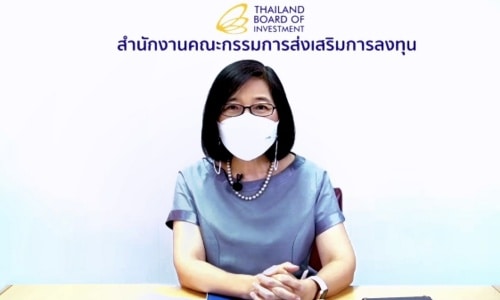As part of a package of incentives aimed at encouraging companies to reduce greenhouse gas emissions, the Thailand Board of Investment (BOI) has laid out a new measure to support production – at scale – of electric vehicles of all types in the country.
In a meeting held yesterday, the board agreed to improve the investment promotion policy for electric vehicle manufacturing – a new measure extended to the to the production of battery electric vehicles (BEV) platforms, that consist of an energy storage system, charging module, and front and rear axle module.
“In general, a platform represents at least 70% of the total cost of a BEV. The sharing platform concept is a new trend for the automotive industry. In particular, this type of production will provide more flexibility, shorter time for product development, and economies of scale. Given the relatively small local and regional markets of BEVs, manufacturing that brings more unit cost reduction will help BEVs compete better and will lead to faster market expansion,” said BOI secretary general Duangjai Asawachintachit.
The BOI also approved the promotion of electric bicycles (E-bikes), which have experienced rapid market growth over the past few years. The tax incentives offered include a minimum of 3 years of corporate income tax exemption. These additions will make the BOI promotion scheme for electric vehicles comprehensive.
Reducing greenhouse gas reduction
In yesterday’s meeting, the board approved a series of measures to encourage investments that will reduce impact on the environment, support sustainable development, and participate to the development of the BCG model (Bio, Circular and Green economy).
The BCG model, as defined by the Thai Government, encompasses industries that allow inclusive, sustainable growth while reducing waste, pollution and dependence on finite resources. Thailand is a major agricultural producer, tourism destination and medical hub and its BCG sector comprises many of the country’s important industries: agriculture and food; bioenergy, biomaterials and biochemicals; medical and wellness; and tourism and the creative economy.
These measures include:
1) Grassroot economy support scheme that will support local organisations involved in the development of sustainable agricultural activities such as low-methane rice farming. This new addition is expected to encourage competent companies towards sustainable agriculture. The deadline for applications under the grassroots economy support scheme will be extended to end 2022.
2) 3-year tax holidays will be offered to investments in machinery upgrades aimed at reducing greenhouse gas emissions. This will be an addition to the existing productivity enhancement scheme. This new measure is expected to contribute to the country's commitments on greenhouse gas reduction.
3) Adjustments to the conditions and benefits applying to some business categories to encourage eco-friendly technologies:
- Investments in cold storage facilities and cold storage transport operations using natural refrigerants, that reduce impact on the environment, will be granted 3-year corporate income tax exemptions.
- Petrochemical production facilities implementing Carbon Capture Utilization and Storage (CCUS) technologies will be granted 8-year corporate income tax exemptions.
4) Introduction of a new promotion category for natural gas separation plants which if they are implementing CCUS technologies will be granted 8-year corporate income tax exemptions.
In the first nine months of 2020, local and international companies applied to invest as much as US$1.7 billion in Thailand in more than 300 projects in the sectors listed as “BCG”, according to the Thailand Board of Investment (BOI).
This lifted the total value of BCG applications since the start of 2018 to US$6.7 billion, reinforcing Thailand’s position as a Bio-Circular-Green hotspot, the BOI said.
To date, these BCG sectors have a combined economic value of US$113 billion, according to Thailand’s Ministry of Higher Education, Science, Research and Innovation. By 2025, the government aims to increase that value by 30%to US$147 billion, making BCG industries equivalent to 25% of the national gross domestic product.



